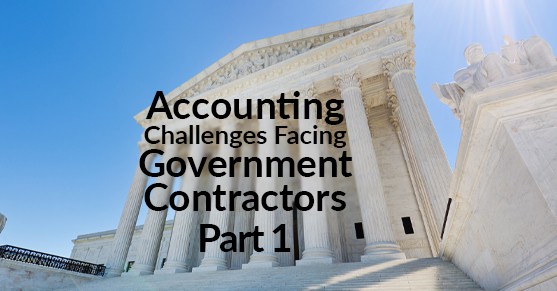Business accounting on its own has a variety of complexities, but accounting for government contractors puts a whole new meaning to the role of business accounting. Government contractors are not only under the dominion of regular accounting practices, but their industry is riddled with accounting regulations, requirements, and at times, numerous challenges.
In the first part of this blog series, we’d like to cover a few common challenges regarding accounting for government contractors. For instance, what are the biggest challenges facing government contractors? How should government contractors avoid them? And, what are some general best practices when it comes to accounting for government contractors and system compliance? These are questions that GovCon365’s experts know very well. Here are our two cents on accounting challenges and best practices.
Constant Change in Government Requirements
- The accounting requirements for government contractors are much denser than those set out for commercial businesses. Not only are the requirements and regulations more complicated, but they’re also more erratic, as many of the rules and specifications can change rapidly. For the most part, the Financial Accounting Standards Board (FASB) lays down the laws in the standards set out by the Financial Accounting Standards Board (FASB), including the Cast Accounting Standards (CAS) and Federal Acquisition Regulations (FAR).
- The best thing government contractors can do, whether they’re new t the industry or seasoned professionals, is to keep an eye on the standards and regulations. It’s essential that accountants know what requirements have changed, and be fully aware of what auditors, like the Defense Contract Audit Agency (DCAA), are looking for during their review.
Maintaining Documentation Regarding Regulation Changes
- As we mentioned above, accounting requirements for government contractors are constantly changing, making it hard to always be aware of new statutes. Even more challenging is making sure that company documentation, policies, procedures, and systems align with the changing standards. Many new government contractors often find themselves at a loss in this area and are unable to keep up with the constant flow of alterations.
- Vigilance is key to staying on track with government requirements. Not only should your business anticipate the changes — specifically, keeping an eye on federal laws for transparency, finances, and the economy — but it should also be flexible to make way for modifications and adjustments around current operations and documentation.
Fully Preparing for Audits
- Audits are detrimental to making sure government contractors are maintaining compliant systems and ethical financial operations. Unfortunately, they can come at any time, and whether your business is subject to the review of the DCAA or DCMA, your company needs to be prepared at a moment’s notice. And, when government contractors are knocked for noncompliance, it costs them time, labor, contracts, and other opportunities.
- The best thing government contractors can do is operate with the expectation that, at any time, an auditor could come knocking on the door. Keep procedures concise and consistently inspect your systems/documentation to confirm compliance.
Gaining DCAA Approval
- Whether you’re dealing with timekeeping, direct/indirect cost segregation, invoice clauses, or one of the various other DCAA/DCMA requirements, gaining approval from either agency is no walk in the park. Without the proper infrastructure and human resources, many government contractors have trouble keeping up and gaining approval for their accounting systems.
- In this realm, it is vital to have someone who is dedicated to completely understanding all accounting requirements and reviewing your accounting system. If you don’t have the internal resources to do this, partnering with an experienced expert like GovCon365 can help you implement a system like Dynamics 365 for Government Contractors to automate the process and help guarantee DCAA/DCMA approval of financial systems.
There’s a lot of challenges facing government contracting accountants and accounting systems. However, with the right actions, preparation, and system, your business can attain compliant accounting systems and practices, gain approval, and be ready for the long haul in government contracting. In Part 2 of this blog series, we’ll be looking at the spectrum of duties for government contracting accountants and best practices for them, and the company as a whole.
If your business is facing any of these accounting issues or has questions about how to best move forward with a fully compliant accounting system, feel free to engage with us in the comments below or reach out to us here.

